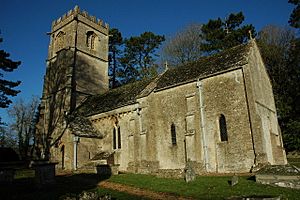Church of St John the Evangelist, Elkstone facts for kids
Quick facts for kids Church of St John the Evangelist |
|
|---|---|
 |
|
| Lua error in Module:Location_map at line 420: attempt to index field 'wikibase' (a nil value). | |
| Denomination | Church of England |
| Architecture | |
| Heritage designation | Grade I listed building |
| Designated | 12 November 1958 |
| Administration | |
| Benefice | The Churn Valley |
| Diocese | Gloucester |
| Province | Canterbury |
The Church of St John the Evangelist is a beautiful old church located in Elkstone, a village in the Cotswold District of Gloucestershire, England. This special church was built way back in the 1100s, which is the 12th century! It's so important that it's officially recognized as a Grade I listed building, meaning it's a building of exceptional historical interest.
Contents
A Look at the Church's History
How the Church Was Built
The main parts of the church, like the nave (where people sit) and the chancel (near the altar), were first built around the year 1160. At that time, it also had a tower in the middle.
Later, in the 1200s (the 13th century), the central tower was taken down. The roof was made taller, and a special room called a columbarium or dovecote was added. This was a place for pigeons! Then, in the 1400s (the 15th century), a brand new, taller tower was built at the west end of the church.
Modern Updates
The church is part of a group of churches in the Churn Valley. In 2017, something new was added: an "eco-loo." This is a special composting toilet that helps the environment. The Bishop of Tewkesbury officially opened it.
Exploring the Church's Architecture
Building Materials and Design
The Church of St John the Evangelist is made from limestone, a type of stone. Its roofs are covered with stone slates. The church has a nave, a Chancel, a porch on the south side, and a tower on the west side. The old dovecote still has pigeon holes in its north and east walls.
Ancient Details and Carvings
Some parts of the church, like its arches and vaulted ceilings, show amazing examples of Romanesque architecture. This style was popular a very long time ago.
Look closely at the south doorway of the nave. It has a Norman tympanum, which is a carved stone panel above the door. This carving shows Jesus sitting on a soft throne. He holds the Book of Judgement in his left hand and gives a blessing with his right. The arch leading into the chancel also has a beautiful Norman chevron pattern, which looks like zigzags.
Bells and Gargoyles
The church tower holds six bells. The oldest of these bells was made way back in 1657! All around the outside of the church, you can spot many interesting gargoyles and grotesques. These are carved stone figures, often with funny or scary faces, that sometimes act as water spouts.
Inside the Church
Step inside, and you'll see box pews, which are like individual wooden boxes where families used to sit. There's also a wooden Jacobean hexagonal pulpit. This pulpit, where the priest gives sermons, dates all the way back to 1609.
 | Stephanie Wilson |
 | Charles Bolden |
 | Ronald McNair |
 | Frederick D. Gregory |

